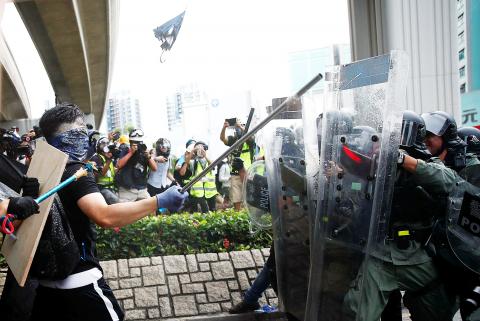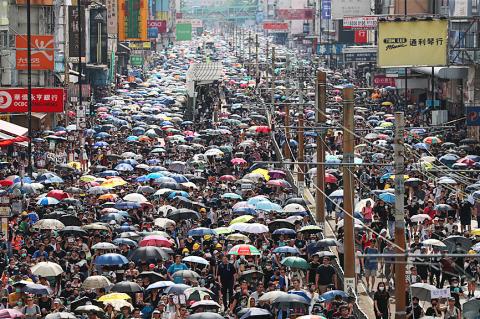Hong Kong police yesterday fired tear gas at protesters holding a banned rally against suspected triad gangs who beat up pro-democracy demonstrators near the Chinese border on Sunday last week.
Riot police fired dozens of rounds of tear gas in Yuen Long after tense standoffs with protesters, some of whom were throwing projectiles and had surrounded a police van.
Public anger has been raging since Sunday, when a gang of men in white T-shirts, armed with poles and batons, set upon protesters and bystanders in Yuen Long Station.

Photo: Reuters
Police have been heavily criticized for being too slow to respond to Sunday’s violence, fueling accusations of collusion or turning a blind eye — allegations the force has denied.
Yesterday’s violence compounds the political crisis with the territory’s pro-Beijing leadership seemingly unable — or unwilling — to end the chaos.
Yuen Long is in Hong Kong’s New Territories, a rural area where many of the surrounding villages are known for triad connections and their staunch support for the pro-Beijing establishment.

Photo: EPA-EFE
Police say they have arrested 12 people so far in connection with Sunday’s violence, nine of whom have known triad links.
The white shirt mob ran into two villages near Yuen Long MTR Station after their attack and later left without police making any arrests, despite a large presence of officers.
These two villages became the focus of protester anger yesterday.
The rally began peacefully, but small groups, many in helmets and carrying shields, confronted police outside the villages and accused them of protecting triads.
Tensions soon escalated with projectiles hurled and a police van containing officers surrounded and daubed in graffiti.
Soon tear gas rounds were arcing through the air and a now-familiar pattern of running battles between police and protesters began.
Throughout the afternoon protesters formed shield walls of umbrellas, scattering each time new volleys of tear gas came their way.
In a rare move, police banned the rally, saying that they feared reprisal attacks against villagers from protesters, a decision that only heightened anger toward a force already perceived to be protecting pro-government aggressors.
Social messaging channels used to organize the largely leaderless movement quickly filled up with calls for people to have a “shopping spree” in Yuen Long or play Pokemon Go there.
Crowds spilled out of Yuen Long’s main station in the afternoon as the illegal march began peacefully. Many shops were shuttered.
“Every one of us came here on our own initiation,” a 25-year-old medical worker surnamed Ng said. “So I don’t think this is an illegal assembly. I’ve just come here as an individual to tell people my thoughts.”
Weeks of protests with huge turnouts have had little luck persuading Beijing or Hong Kong’s leaders. Beijing has issued increasingly shrill condemnations, but has left it to the territory’s government to deal with the situation.
Hong Kong Chief Executive Carrie Lam (林鄭月娥) has shown no sign of backing down beyond agreeing to suspend the extradition bill.
Protesters also plan to march today through a district where riot police fired tear gas and rubber bullets at projectile-hurling protesters the week before.
Police have allowed a rally to take place, but denied protesters permission to march, raising the likelihood of further confrontations.

MAKING WAVES: China’s maritime militia could become a nontraditional threat in war, clogging up shipping lanes to prevent US or Japanese intervention, a report said About 1,900 Chinese ships flying flags of convenience and fishing vessels that participated in China’s military exercises around Taiwan last month and in January last year have been listed for monitoring, Coast Guard Administration (CGA) Deputy Director-General Hsieh Ching-chin (謝慶欽) said yesterday. Following amendments to the Commercial Port Act (商港法) and the Law of Ships (船舶法) last month, the CGA can designate possible berthing areas or deny ports of call for vessels suspected of loitering around areas where undersea cables can be accessed, Oceans Affairs Council Minister Kuan Bi-ling (管碧玲) said. The list of suspected ships, originally 300, had risen to about

DAREDEVIL: Honnold said it had always been a dream of his to climb Taipei 101, while a Netflix producer said the skyscraper was ‘a real icon of this country’ US climber Alex Honnold yesterday took on Taiwan’s tallest building, becoming the first person to scale Taipei 101 without a rope, harness or safety net. Hundreds of spectators gathered at the base of the 101-story skyscraper to watch Honnold, 40, embark on his daredevil feat, which was also broadcast live on Netflix. Dressed in a red T-shirt and yellow custom-made climbing shoes, Honnold swiftly moved up the southeast face of the glass and steel building. At one point, he stepped onto a platform midway up to wave down at fans and onlookers who were taking photos. People watching from inside

Japan’s strategic alliance with the US would collapse if Tokyo were to turn away from a conflict in Taiwan, Japanese Prime Minister Sanae Takaichi said yesterday, but distanced herself from previous comments that suggested a possible military response in such an event. Takaichi expressed her latest views on a nationally broadcast TV program late on Monday, where an opposition party leader criticized her for igniting tensions with China with the earlier remarks. Ties between Japan and China have sunk to the worst level in years after Takaichi said in November that a hypothetical Chinese attack on Taiwan could bring about a Japanese

The WHO ignored early COVID-19 warnings from Taiwan, US Deputy Secretary of Health and Human Services Jim O’Neill said on Friday, as part of justification for Washington withdrawing from the global health body. US Secretary of State Marco Rubio on Thursday said that the US was pulling out of the UN agency, as it failed to fulfill its responsibilities during the COVID-19 pandemic. The WHO “ignored early COVID warnings from Taiwan in 2019 by pretending Taiwan did not exist, O’Neill wrote on X on Friday, Taiwan time. “It ignored rigorous science and promoted lockdowns.” The US will “continue international coordination on infectious